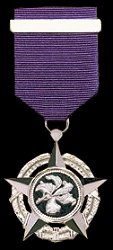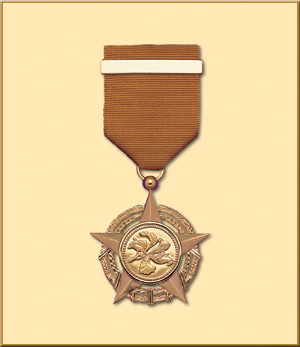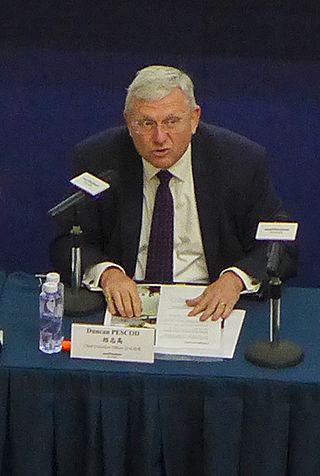
The politics of Hong Kong takes place in a framework of a political system dominated by its quasi-constitutional document,the Hong Kong Basic Law,its own legislature,the Chief Executive as the head of government and of the Special Administrative Region and of a politically constrained multi-party presidential system. The Government of the Hong Kong Special Administrative Region of the People's Republic of China is led by the Chief Executive,the head of government.

Anson Maria Elizabeth Chan Fang On-sang,is a retired Hong Kong politician and civil servant who was the first ethnic Chinese and woman to serve as Chief Secretary,the second-highest position in both the British colonial government and the Hong Kong SAR government under the Chinese sovereignty from 1993 until she retired from the government in 2001,sparking speculations of her growing rift with Chief Executive Tung Chee-hwa.
The existing Hong Kong honours system was created after the transfer of government of Hong Kong to the People's Republic of China as a special administrative region in 1997. Before that,Hong Kong was a British dependent territory and followed the British honours system.

Queen's College is the first public secondary school founded in Hong Kong by the British colonial government. It was initially named The Government Central School in 1862 and later renamed Victoria College in 1890,and finally obtained the present name of Queen's College in 1894. It is currently located in Causeway Bay.
The Hong Kong order of precedence is a nominal and symbolic hierarchy of important positions within the Government of Hong Kong. Administered by the government's Protocol Division,the hierarchy does not determine the order of succession for the office of Chief Executive,which is instead specified by the Basic Law of Hong Kong.

The Silver Bauhinia Star is the second rank of the Order of the Bauhinia Star under the honours system of Hong Kong,awarded to people who have taken a leading part in public affairs or voluntary work over a long period. The award was created in 1997 to replace the British honours system after the transfer of sovereignty to People's Republic of China and the establishment of the Hong Kong Special Administrative Region.
The Gold Bauhinia Star is the highest rank in Order of the Bauhinia Star,under the honours system of Hong Kong,created in 1997 to replace the British honours system after the transfer of sovereignty to the People's Republic of China and the establishment of the Hong Kong Special Administrative Region (HKSAR).

The Bronze Bauhinia Star is the lowest rank in Order of the Bauhinia Star,under the honours system of Hong Kong,created in 1997 to replace the British honours system after the transfer of sovereignty to the People's Republic of China and the establishment of the Hong Kong Special Administrative Region (HKSAR).

Sophie Leung Lau Yau-fun,OBE,GBS,JP is a resident of the Hong Kong SAR,Mrs. Sophie Leung had been a Member of the Legislative Council of HKSAR from 1996 to 2012,representing the textile and garment industry,and has been a Deputy of the National People's Congress of the People's Republic of China since 2003.

The Fifth Legislative Council of Hong Kong was the fifth meeting of the legislative branch of the Hong Kong Special Administrative Region Government. The membership of the LegCo is based on the 2012 election. The term of the session is from 1 October 2012 to 30 September 2016,during the term in office of the Chief Executive Leung Chun-ying. Due to the new arrangements agreed in a contentious LegCo vote in 2010,the session consists of the new total of 70 seats in LegCo,ten more than previously,with 35 members elected in geographical constituencies through direct elections,and 35 members in functional constituencies,in which five District Council (Second) functional constituency seats each represent all 18 District councils of Hong Kong voted for by all resident voters in Hong Kong. The Democratic Alliance for the Betterment and Progress of Hong Kong remained the largest party while the pan-democrats secured the one-third crucial minority. Notable new members of the LegCo members include Gary Fan from the new established party Neo Democrats and first openly gay councillor,People Power's Ray Chan Chi-chuen.

The Fourth Legislative Council of Hong Kong was the fourth meeting of the legislative branch of the Hong Kong Special Administrative Region Government. The membership of the LegCo is based on the 2008 election. The term of the session is from 1 October 2008 to 30 September 2012,during the second half of the Donald Tsang's administration and first two months of the Leung Chun-ying's term in office. The meeting place was moved from the Legislative Council Building to the new built Legislative Council Complex in 2011. The Democratic Alliance for the Betterment and Progress of Hong Kong remained the largest party with 10 seats. Notable newcomers to the Legislative Council included Regina Ip,Priscilla Leung,Wong Yuk-man,Tanya Chan,and Paul Tse.

The Third Legislative Council of Hong Kong was the meeting of the legislative branch of the Hong Kong Special Administrative Region Government. The membership of the LegCo is based on the 2004 election. The term of the session was from 1 October 2004 to 30 September 2008,during the second half of the Tung Chee-hwa's administration until his resignation in 2005 and was replaced by Donald Tsang for the rest of the term,and also the beginning of the third term of Chief Executive after Tsang won in the 2007 Election. The Democratic Alliance for the Betterment of Hong Kong (DAB) became the largest party with 10 seats. Notable newcomers to the Legislative Council included Leung Kwok-hung,Alan Leong,Ronny Tong,Albert Cheng,and Jeffrey Lam.
David Lan Hong-TsungGBS,ISO,JP is a former politician and civil servant in Hong Kong who served as the Secretary for Home Affairs from September 1997 to 7 July,2000. He is currently a National Committee Member of the Chinese People's Political Consultative Conference representing Hong Kong,serving in that post since January 2003.
Alan Lai NinGBS,JP is a Hong Kong politician and civil servant who served as the Director-General of the Trade and Industry Department from 1996 to 1999,Commissioner of the Independent Commission Against Corruption from 1999 to 2002 and the Ombudsman of the Office of the Ombudsman from 2009 until his retirement in 2014. He is now a consultant with the Independent Police Complaints Council.
The election for the Hong Kong deputies to the 11th National People's Congress (NPC) was held on 25 January 2008. 36 Hong Kong deputies were elected by an electoral college composed of 1,234 members.
The Faculty of Arts of The University of Hong Kong (HKU) is one of the oldest faculty in the University of Hong Kong,and is considered to be one of Asia's best Arts and Humanities faculties.

Duncan Warren Pescod is the former director of the West Kowloon Cultural District Authority,a statutory body of the Hong Kong Government.

Come Home Love:Lo and Behold,alternately known as Come Home Love:Happy Courier,is a 2017 daily half-hour Hong Kong sitcom created by TVB,starring Lau Dan,Angela Tong,Koni Lui,Stanley Cheung,Pal Sinn,Mandy Lam,Andrea So,Joyce Tang and Kalok Chow. It is produced by Law Chun-ngok who also produced the three previous Come Home Love.
The election for the Hong Kong deputies to the 13th National People's Congress (NPC) was held on 19 December 2017. 36 Hong Kong deputies were elected by an electoral college composed of 1,989 members.










